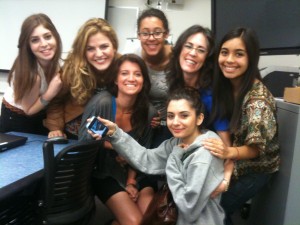The New Learning Is Ancient
What Can’t Be Digitized
“Face-to-face” is a misattribution. It’s not the face or the body that conveys intimacy, but shared, dynamic experiences of time.
Virtual learning environments are awkward because every gesture, every blink or wayward glance, every suppressed sigh, has to be initiated as a software procedure in order to be “seen” in the virtual classroom. Working now for 2 years in a classroom that’s predominantly virtual and always synchronous, I’m alive to the tens of thousands of data points I naturalize in any ordinary “face-to-face” 90-minute classroom session. Students and I converse at a breakneck pace in three or four modalities in our virtual classroom, but even this can’t move at the speed of (en)light(enment). The software is primitive, in its pre-Ed Sullivan TV days. For that reason it’s a remarkable learning environment, a once-in-a-lifetime opportunity to play in a “classroom” while it’s still an absolutely common experience, not hyper-customized, like medieval villagers who all baked bread in the same oven in the village square.
It’s a bizarre truth that the same students who will slouch in sweats around a conference table will sometimes refuse, in the virtual classroom, to come on-camera unless they look “camera ready”: men and women alike; it doesn’t skew by gender. As computing power increases, and as a generation of learners log 10,000 hours online before they hit middle school, the software’s insufficiency will come to an end.
That’s what we ask as we take the measure of MOOCs. That’s what administrators and donors reckon with when they assess whether to invest in a campus’s physical capacity. A generation of students bowed by debt weighs the costs and benefits of live, co-present learning against the ease but monotony of asynchronous “discussion board” learning. But “will the embodied classroom end” is not the real question.
Because the new learning is ancient.
Agape, loving-kindness, can’t be generalized. It’s a specific call or procedure, a transaction that’s both medium- and user-specific. It’s existed for thousands of years passed from body to body in whatever counted as “the classroom” of its day. It will persist if we create conditions for it to flourish. Before ubiquitous computing, agape was a byproduct of physical intimacy and shared dreaming that unfolds in a good class over a semester. “I’m more accustomed to looking at a screen than at my professors,” one student told me after our first virtual class. “But I’m scared that this is what education is going to become.”
I’m not; and I suspect that her fear that “this is what education would become” has been diminished by the durable artifacts of fifteen weeks of nearly constant collaboration with the other three members of “Team Coke.” “I learned how to mic and light a scene,” she told me in office hours outside near the inverted fountain last week. “We stayed up til 3 with Graham even though he was the only one editing.” I interpret this to mean that at the beginning of the term, Jessi thought the classroom was mine, and that she entered my world when she streamed me inside the screen of her MacBook Pro. Over the term her classroom became anywhere she and her teammates happened to be working: filming at the student center or on John McKay Field; editing and voicing over in her apartment and goofing around with her teammates into the wee hours; arriving, always a little late, into the physical space of our classroom; streaming in herself when she wanted to, and almost always game to push an idea some place unexpected. That’s her classroom. I’m the one who makes sure she can build it anywhere she wants to go.
Students from fifteen years ago, or five years ago, or from last term will Facebook me, or find me via email or Twitter and say, “Did you see Aung San Suu Kyi?…. or….Franzen’s new book?….. or……how Machimima is contracting content for women…..” A woman selling cosmetics a Nordstroms stopped me mid-sentence and said: “you were my literature professor. I recognize your voice.” When did you graduate? I asked. “2004.”
It doesn’t matter to me if my classroom is a little rectangle in a building or a little rectangle above my keyboard. Doors are rectangles; rectangles are portals. We walk through. What can’t be digitized is love.






Pingback: Hybrid Pedagogy | Decoding Digital Pedagogy, pt. 2: (Un)Mapping the Terrain
Pingback: Double Flip: 3 Insights Flipping the Humanities Seminar - Hybrid Pedagogy
Pingback: Decoding Digital Pedagogy, pt. 2: (Un)Mapping the Terrain - Hybrid Pedagogy